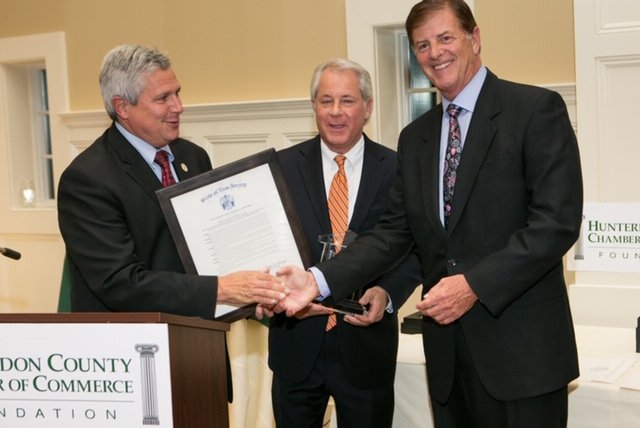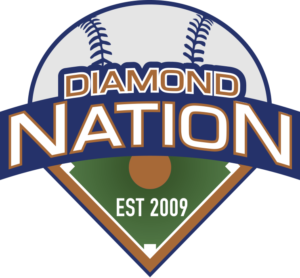Diamond Nation spends much of its day-to-day operation instructing young players and helping to develop their skills to the point where they can play at a high level, be it in high school, college or even professional. Several former Diamond Jacks or NJ Super 17 players are playing Major League baseball today.
It would be spectacular for our instructors and coaches to witness one of our own one day make it to the Major League Baseball Hall of Fame. But, for now, Diamond Nation will have to settle for an honor of its own. Two weeks ago, Diamond Nation was inducted into the Hunterdon County Business Hall of Fame.
Diamond Nation and Healthquest Fitness Center were inducted together under the category of “Contemporary Award.” The award goes to a company established less than 100 years ago, that brings economic growth, prosperity and innovation to Hunterdon County, is currently operating in the county and is a commercial, for profit business.
Coincidentally, Diamond Nation is celebrating its 10th Anniversary and the business has not only shown consistent growth but it has generated significant economic activity throughout Hunterdon County and beyond.
“We have experienced tremendous growth over the last 10 years,” says Diamond Nation’s general manager Nick Massari. “We now employee more than 250 people on a yearly basis. While many of these are seasonal employees, we have expanded our administrative staff as well.”
Indeed, the story of Diamond Nation cannot be told without the back story. That backstory is the inception of Jack Cust Baseball Academy and what was truly a dream of the Cust family to turn athletes in the northeast into viable competitors with their southern and western counterparts.
The Custs built Jack Cust Baseball Academy in December 1997 to provide indoor instruction and training during the cold winter months. This was no half-hearted operation and it was one with a very serious plan for the present and a vision for the future. The academy immediately implemented the Jack Cust Hitting School and Hitting Philosophy.

Less than three years later, in June of 2000, a turf field was constructed next to JCBA. Every improvement or addition to their baseball academy seemed to ignite more ingenuity in the Custs.
By December of 2003, a 130,000 square foot sports dome — to become known as the Healthquest Sports Dome — rose above Flemington on the north side of Route 31. Jack Cust Baseball Academy and its accompanying sports dome quickly became a go-to training site for serious ball players aged 10-18 in the cold, unforgiving months of November-through-March.
Winter leagues sprouted at the Dome and the level and depth of instruction and training naturally exploded as players had the freedom to hit, field, throw and run to their hearts’ desire.
The spring and summer months at JCBA’s new turf field had already seen a steady flow of baseball talent, but there was a problem. One field wasn’t going to come close to meeting the needs of the flow of players and teams that wanted in.
Jack, Sr., who played at Seton Hall University, and Jack, Jr., drafted in the first round out of Immaculata High School in 1997 by the Arizona Diamondbacks, didn’t have to look far in their desire to expand. A short walk from JCBA and on the corner of Bartles Corner and River Road stood a parcel of land that seemed to be begging for baseball and softball.
The Custs didn’t look at the 35-acre parcel as an opportunity for modest expansion of JCBA. They sensed a real opportunity to create something that was unique, the very first in New Jersey and, indeed, the northeast. By the summer of 2009, Diamond Nation rose from a pasture in rural Hunterdon County. And with it came earth-shaking change to the sport of travel baseball and softball in the northeast.
The 35-acre layout boasted six artificial turf playing fields — four large fields and two Little League-sized fields — 12 indoor and outdoor batting cages and 28 bullpens. The main building at the entrance to the complex included a retail shop and reception area. In the middle of the complex stood a large structure called the Scout Tower, where scouts could view four fields from a second floor vantage point.
Those facilities are thriving today as nearly 3,000 teams utilize Diamond Nation annually, filling local hotels, eateries and shopping venues with customers year ‘round.
